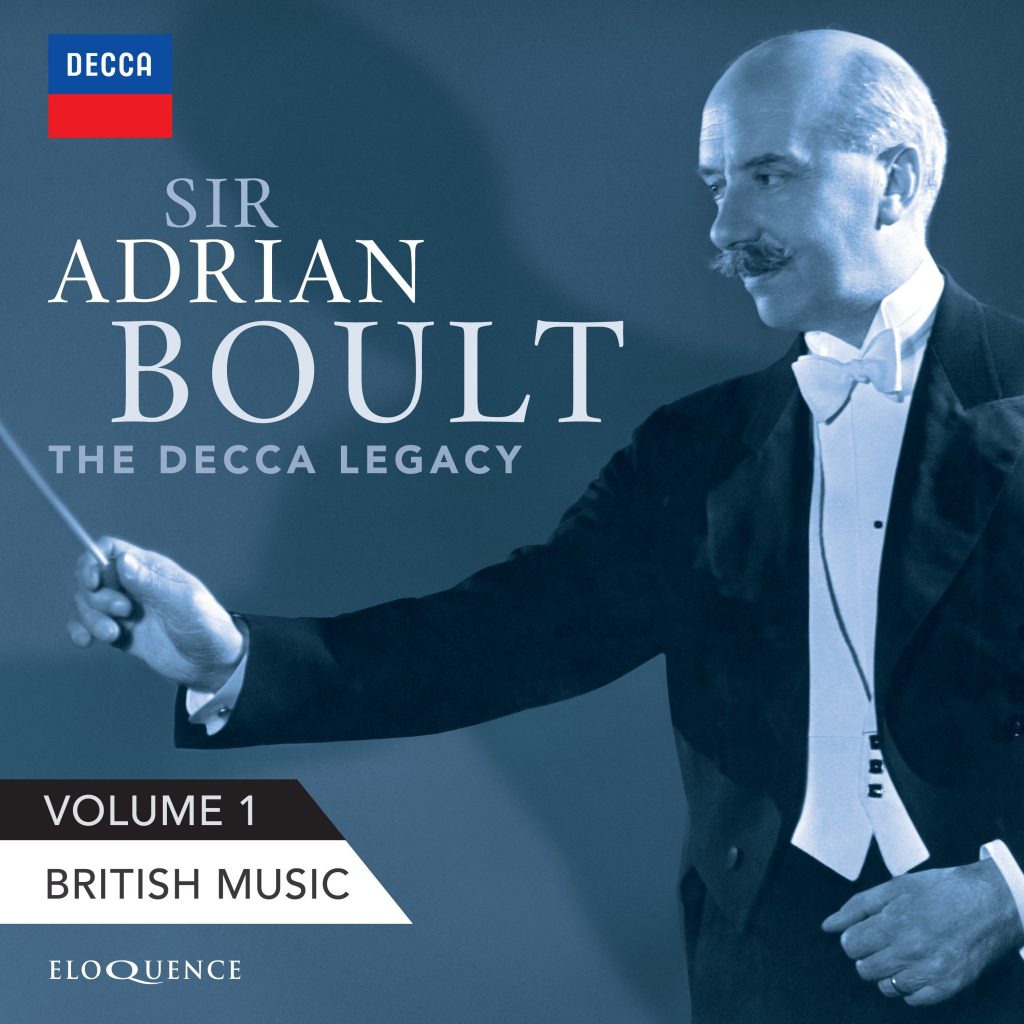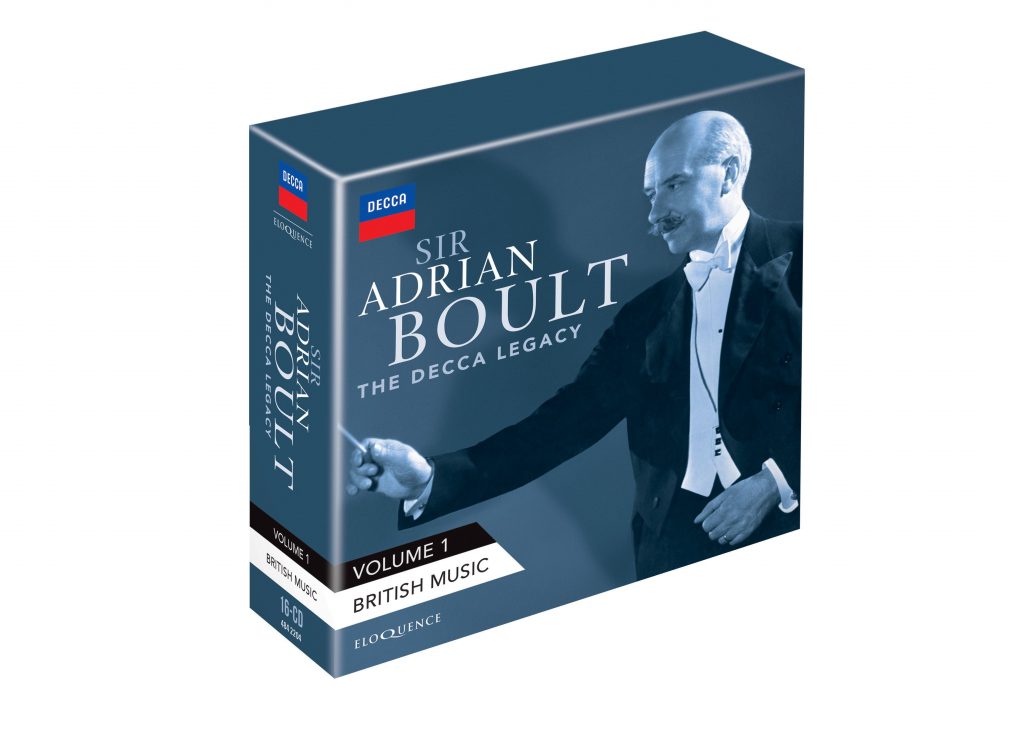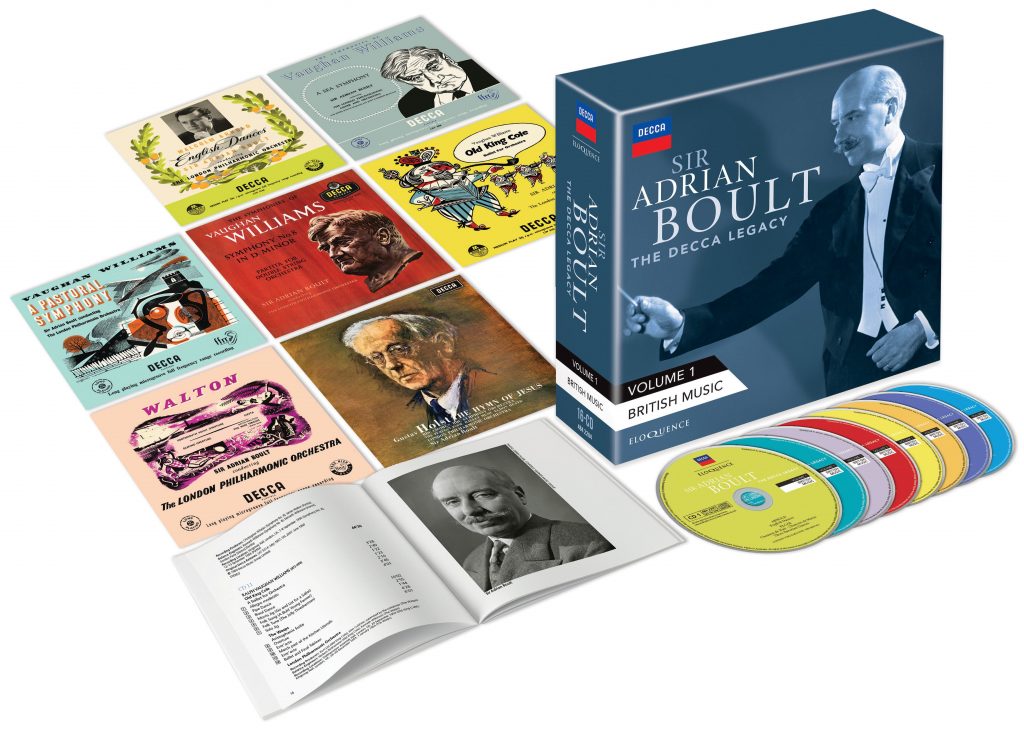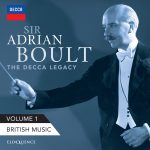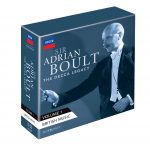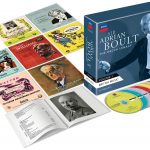Boult began recording for Decca in 1950 once he had been forcibly retired by the BBC at the age of 60. The company lost no time in bringing the unrivalled authority of his British music interpretations to the record-buying public. Decca’s engineering team and equipment was widely regarded as the best available at the time, led by the likes of producer John Culshaw and engineer Kenneth Wilkinson, and they captured the spatial aspects and colours of Vaughan Williams the symphonist with unprecedented fidelity at the time.
Boult’s later recording of the Ninth and speeches by both Boult and Vaughan Williams have been included. So has Boult’s 1953 recording of incidental music to The Wasps, coupled with the much rarer Old King Cole ballet, and Boult’s second, 1954 version of Job, a work with which he was so closely associated for many years.
This collection features a notable first in the Boult discography: four previously unpublished recordings of music by his friend Holst. While recording other English repertoire back in the mono era Boult had attempted to carve out sufficient time in the sessions for a Holst LP which never came to fruition. Four pieces – the Somerset Rhapsody, Marching Song, the Scherzo from an unfinished symphony (all in mono) and Country Song (in stereo) are now published for the first time.
Boult also worked extensively with the best young British composers of his day, and this underrated aspect of his conducting is represented in the collection by 1954 mono accounts of Malcolm Arnold’s English Dances and from 1960 the First Symphony of Humphrey Searle – coupled for the first time since its release with two pieces composed and conducted by the Hungarian émigré Mátyás Seiber, as on the original LP.
CD 1
MALCOLM ARNOLD
1–4 Four English Dances, Op. 27
5–8 Four English Dances, Op. 33
EDWARD ELGAR
9 Chanson de Matin, Op. 15 No. 2
10 Chanson de Nuit, Op. 15 No. 1
11–13 Three Bavarian Dances
London Philharmonic Orchestra
Sir Adrian Boult
CD 2
EDWARD ELGAR (1857–1934)
1–3 Violin Concerto in B minor, Op. 61
Alfredo Campoli, violin
London Philharmonic Orchestra
Sir Adrian Boult
CD 3
RALPH VAUGHAN WILLIAMS (1872–1958)
1–8 A Sea Symphony
John Cameron, baritone
Isobel Baillie, soprano
London Philharmonic Choir
Frederic Jackson, chorus master
London Philharmonic Orchestra
Sir Adrian Boult
CD 4
RALPH VAUGHAN WILLIAMS (1872–1958)
1–4 Symphony No. 2 ‘A London Symphony’
London Philharmonic Orchestra
Sir Adrian Boult
CD 5
RALPH VAUGHAN WILLIAMS (1872–1958)
1–4 Symphony No. 3 ‘A Pastoral Symphony’
Margaret Ritchie, soprano
London Philharmonic Orchestra
Sir Adrian Boult
CD 6
RALPH VAUGHAN WILLIAMS (1872–1958)
1–4 Symphony No. 4 in F minor
London Philharmonic Orchestra
Sir Adrian Boult
CD 7
RALPH VAUGHAN WILLIAMS (1872–1958)
1–4 Symphony No. 5 in D major
London Philharmonic Orchestra
Sir Adrian Boult
CD 8
RALPH VAUGHAN WILLIAMS (1872–1958)
1–4 Symphony No. 6 in E minor
5 Speech by Vaughan Williams
London Philharmonic Orchestra
Sir Adrian Boult
CD 9
RALPH VAUGHAN WILLIAMS (1872–1958)
1–5 Symphony No. 7 ‘Sinfonia Antartica’
6 Speech before Symphony No. 9 by Sir Adrian Boult
7–10 Symphony No. 9 in E minor
Symphony No. 7:
Margaret Ritchie, soprano
Sir John Gielgud, speaker
London Philharmonic Choir
Frederic Jackson, chorus master
London Philharmonic Orchestra
Sir Adrian Boult
CD 10
RALPH VAUGHAN WILLIAMS (1872–1958)
1–4 Symphony No. 8 in D minor
5–8 Partita for Double String Orchestra
London Philharmonic Orchestra
Sir Adrian Boult
CD 11
1–7 Old King Cole
A ballet for Orchestra
8–12 The Wasps
Aristophanic Suite
London Philharmonic Orchestra
Sir Adrian Boult
CD 12
1–9 Job – A Masque for Dancing
Joseph Shadwick, solo violin
London Philharmonic Orchestra
Sir Adrian Boult
CD 13
SIR WILLIAM WALTON (1902–1983)
1 Portsmouth Point
2 Siesta
3 Scapino – A Comedy Overture
4–9 The Wise Virgins
Ballet suite, arranged from works by J.S. Bach
London Symphony Orchestra
Sir Adrian Boult
CD 14
A Concert of English Music
GEORGE BUTTERWORTH (1885–1916)
1 A Shropshire Lad – Rhapsody
2 The Banks of Green Willow
ARNOLD BAX (1883–1953)
3 Tintagel
GUSTAV HOLST (1874–1934)
4–6 The Perfect Fool – Ballet Music, Op. 39, H150
7 A Somerset Rhapsody, Op. 21 No. 2, H87
8 Scherzo from Unfinished Symphony H192
9 Marching Song (Songs Without Words, Op. 22 No. 2), H88/2
London Philharmonic Orchestra
Sir Adrian Boult
CD 15
GUSTAV HOLST (1874–1934)
1 The Hymn of Jesus, Op. 37, H140
BBC Chorus
BBC Symphony Orchestra
2–4 The Perfect Fool, Ballet Music Op. 39, H150
5 Egdon Heath, Op. 47, H172
6 Country Song (Songs Without Words, Op. 22 No. 1), H88/1
London Philharmonic Orchestra
Sir Adrian Boult
CD 16
HUMPHREY SEARLE (1915–1982)
1–4 Symphony No. 1, Op. 23*
London Philharmonic Orchestra
Sir Adrian Boult
MÁTYÁS SEIBER (1905–1960)
5 Elegy for viola and small orchestra°
Cecil Aronowitz, viola
London Philharmonic Orchestra
Mátyás Seiber
6–8 Three Fragments from ‘A Portrait of the Artist as a Young Man’
Sir Peter Pears, speaker
Dorian Singers
Melos Ensemble
Mátyás Seiber
CD 1
Recording Producer: James Walker
Balance Engineer: Kenneth Wilkinson
Recording Location: Kingsway Hall, London, UK, 18–19 February 1954 (Elgar: Chansons), 21 October 1954 (Elgar: Three Bavarian Dances), 1–2 November 1954 (Arnold: English Dances)
Original Decca LP Releases: LW 5174 (Elgar: Chansons, Three Bavarian Dances): May 1955 [Bavarian Dances Nos. 1 & 2 also released on: 45 71067: January 1955]; LW 5166 (Arnold: English Dances): March 1955
P 1954 (Elgar: Chansons), 1955 (Elgar: Three Bavarian Dances; Arnold: English Dances) Decca Music Group Limited
MONO
CD 2
Recording Producer: James Walker
Balance Engineer: Kenneth Wilkinson
Recording Location: Kingsway Hall, London, UK, 28–29 October 1954
Original Decca Release: LXT 5014: February 1955
P 1955 Decca Music Group Limited
MONO
CD 3
Recording Producer: John Culshaw, supervised by the composer
Balance Engineer: Kenneth Wilkinson
Recording Location: Kingsway Hall, London, UK, 28–30 December 1953, 1 January 1954
Original Decca Release: LXT 2907–08: March 1954
P 1954 Decca Music Group Limited
MONO
CD 4
Recording Producer: John Culshaw, supervised by the composer
Balance Engineer: Kenneth Wilkinson
Recording Location: Kingsway Hall, London, UK, 8, 10 January 1952
Original Decca Release: LXT 2693: June 1952
P 1952 Decca Music Group Limited
MONO
CD 5
Recording Producer: John Culshaw, supervised by the composer
Balance Engineer: Kenneth Wilkinson
Recording Location: Kingsway Hall, London, UK, 12–13 December 1952
Original Decca Release: LXT 2787: May 1953
P 1953 Decca Music Group Limited
MONO
CD 6
Recording Producers: John Culshaw, James Walker, supervised by the composer
Balance Engineer: Kenneth Wilkinson
Recording Location: Kingsway Hall, London, UK, 2, 3, 5 December 1953
Original Decca Release: LXT 2909-12: March 1954
P 1954 Decca Music Group Limited
MONO
CD 7
Recording Producers: John Culshaw, James Walker, supervised by the composer
Balance Engineer: Kenneth Wilkinson
Recording Location: Kingsway Hall, London, UK, 2, 3, 5 December 1953
Original Decca Release: LXT 2909-12: March 1954
P 1954 Decca Music Group Limited
MONO
CD 8
Recording Producers: John Culshaw, James Walker, supervised by the composer
Balance Engineer: Kenneth Wilkinson
Recording Location: Kingsway Hall, London, UK, 2, 3, 5 December 1953 and 1 January 1954
Original Decca Release: LXT 2909–12: March 1954
P 1954 Decca Music Group Limited
MONO
CD 9
Recording Producers: John Culshaw, James Walker, supervised by the composer (Symphony No. 7); John Carewe (Symphony No. 9)
Balance Engineers: Kenneth Wilkinson (Symphony No. 7); Aaron Nathanson (Symphony No. 9)
Recording Locations: Kingsway Hall, London, UK, 10–11 December 1953; Walthamstow Assembly Hall, London, UK, 26–27 August 1958 (Symphony No. 9)
Original Decca Releases: LXT 2909–12 (Symphony No. 7): March 1954; 473 241-2 (Symphony No. 9): November 2002 (Symphony No. 9 was an Everest production licensed from that label’s successors to complete the cycle recorded by Decca in 1952–56. First release: Everest LPBR 6006, SDBR 3006: December 1958)
P 1954 (Symphony No. 7), 2002 (Symphony No. 9) Decca Music Group Limited
MONO (Symphony No. 7, Introduction to Symphony 9) ∙ STEREO (Symphony No. 9)
CD 10
Recording Producers: Christopher Whelan (Symphony No. 8); James Walker (Partita)
Balance Engineers: Kenneth Wilkinson (Symphony No. 8); Kenneth Wilkinson [mono], Gordon Parry [stereo] (Partita)
Recording Location: Kingsway Hall, London, UK, 7–8 September 1956 (Symphony No. 8), 12–13 November 1956 (Partita)
Original Decca Releases: LXT 5314: May 1957, SXL 2207: June 1960
P 1960 Decca Music Group Limited
STEREO
CD 11
Recording Producers: Kurt List (Old King Cole); John Culshaw, supervised by the composer (The Wasps)
Balance Engineers: Herbert Zeithammer (Old King Cole); Kenneth Wilkinson (The Wasps)
Recording Locations: Walthamstow Assembly Hall, London, UK, 29 September 1953 (Old King Cole); Kingsway Hall, London, UK, 28–30 December 1953, 1 January 1954 (The Wasps)
Original Releases: Westminster WL5228: January 1954, Decca LW 5151 (Old King Cole): January 1955; Decca LXT 2908 (The Wasps): March 1954
P 1954 (The Wasps), 1955 (Old King Cole) Decca Music Group Limited
MONO
CD 12
Recording Producer: James Walker
Balance Engineer: Kenneth Wilkinson
Recording Location: Kingsway Hall, London, UK, 9, 11–13 January 1954
Original Decca Release: LXT 2937: June 1954
P 1954 Decca Music Group Limited
MONO
CD 13
Recording Producer: James Walker
Balance Engineer: Kenneth Wilkinson
Recording Location: Kingsway Hall, London, UK, 19 October 1954 (The Wise Virgins), 20 October 1954 (Portsmouth Point, Siesta, Scapino)
Original Decca Releases: LW 5157 (The Wise Virgins): January 1955; LXT 5028 (Portsmouth Point, Siesta, Scapino): March 1955
P 1955 Decca Music Group Limited
MONO
CD 14
Recording Producer: James Walker
Balance Engineer: Kenneth Wilkinson
Recording Location: Kingsway Hall, London, UK, 1–2 November 1954
Original Decca Release: LXT 5015: February 1955
P 1955 Decca Music Group Limited
MONO
Recording Producers: John Culshaw (Scherzo, Marching Song); Christopher Whelan (A Somerset Rhapsody)
Balance Engineers: Kenneth Wilkinson [mono], James Brown [stereo] (Scherzo); Kenneth Wilkinson [mono], Gordon Parry [stereo] (Marching Song); Kenneth Wilkinson [mono], Roy Wallace [stereo] (A Somerset Rhapsody)
Recording Locations: Kingsway Hall, London, UK, 14–15 December 1955 (Scherzo), 4–7 December 1956 (Marching Song); Walthamstow Assembly Hall, London, UK, 27 July 1956 (A Somerset Rhapsody)
Matrix Nos.: AR 22321 (A Somerset Rhapsody); AR 21434 (Scherzo); AR 23082 (Marching Song)
P 2022 Universal Music Operations Limited
MONO
CD 15
Recording Producers: Christopher Raeburn (The Hymn of Jesus); Michael Bremner [mono], Ray Minshull [stereo] (The Perfect Fool, Egdon Heath, Country Song)
Balance Engineers: Alan Reeve (The Hymn of Jesus); Kenneth Wilkinson (The Perfect Fool, Egdon Heath, Country Song)
Recording Locations: Kingsway Hall, London, UK, 15 March 1961 (The Perfect Fool, Egdon Heath, Country Song), 12 March 1962 (The Hymn of Jesus)
Original Decca Releases: LXT 6006, SXL 6006 (The Hymn of Jesus, The Perfect Fool, Egdon Heath): September 1962; Country Song: previously unpublished
P 1962 (The Hymn of Jesus, The Perfect Fool, Egdon Heath), 2022 (Country Song) Universal Music Operations Limited
STEREO
CD 16
Recording Producers: Michael Bremner [mono], Ray Minshull [stereo]
Balance Engineers: Peter Attwood [mono], Kenneth Wilkinson [stereo] (Searle: Symphony No. 1; Seiber: Elegy); Kenneth Wilkinson (Seiber: Three Fragments)
Recording Location: Kingsway Hall, London, UK, 19 January 1960 (Searle: Symphony No. 1), 22 January 1960 (Seiber: Elegy), 21–22 March 1960 (Seiber: Three Fragments)
Original Decca Releases: LXT 5588, SXL 2232: September 1960
P 1960 Decca Music Group Limited
STEREO
Although the Seiber items are not conducted by Boult, they are included for sake of completeness of LP SXL 2232 (LXT 5588)
“The Symphony has the air (and I am quite sure, the substance) of a profound intellectual achievement, and that also serves to place it in the great line … Performances are beyond criticism, and recordings are excellent.” High Fidelity, September 1961 (Searle, Seiber)
“Sir Adrian understands the music to perfection and the recording is superb … This record makes an exceptionally eloquent case for Sir William Walton.” High Fidelity, May 1955 (Walton)
“A feast for Holst fans … A fine performance of Egdon Heath.” High Fidelity, February 1963 (Holst)
“Campoli and Boult offer an intense, vigorous, often deeply probing interpretation.” High Fidelity, June 1957 (Elgar: Violin Concerto)
“They are light, tuneful, expertly orchestrated pieces … the playing and recording is first-rate.” High Fidelity, February 1956 (Elgar: Bavarian Dances, etc.)
“A most cunningly contrived set of six dances … They get a lovely performance from Boult and his men, and the sound is faultless.” High Fidelity, June 1956 (Arnold: English Dances)
“Boult deserves unlimited praise, as the presiding hand, for the extraordinarily high level of artistry he manages throughout the symphonies. The conceptions have boldness, thrust and are always carefully thought out … The orchestral playing is of the very highest order.” High Fidelity, August 1954 (Vaughan Williams symphonies)
“There is no doubt but this will be the definitive recording for many years to come.” Irish Monthly, May 1953 (Vaughan Williams: Symphony No. 3)
“A superlative performance from Sir Adrian Boult and the LPO in a recording that not merely possesses outstanding instrumental fidelity but also catches both the most delicate whispers and the biggest climaxes … the most important record of English music so far issued this year.” Musical Times, July 1953 (Vaughan Williams: Symphony No. 3)
“The Perfect Fool music is brilliantly effective in so faithful a recording … Fine performances from chorus and orchestra, obviously enjoying a session with Boult after so long.” Musical Times, December 1962 (Holst)
“As usual, Sir Adrian Boult both observes the letter of the score and penetrates to the spirit beneath its surface. The slow movement for strings is beautifully moulded and the impertinent Scherzo, with its final snook-cocking gesture, comes off brilliantly.” Musical Times, July 1954 (Vaughan Williams: Symphony No. 8)
“An exceedingly capable performance, to whose quality the orchestra contributes in full measure. The recording is first rate and is particularly successful in capturing the peculiar tone-quality of the thrummed accompaniment to the cadenza.” Musical Times, July 1955 (Elgar: Violin Concerto)

